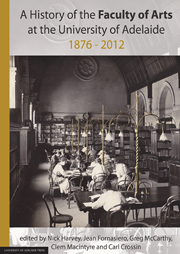Book contents
- Frontmatter
- Contents
- List of Contributors
- 1 The Faculty of Humanities and Social Sciences and the BA Degree at the University of Adelaide since 1876
- 2 Webs of Significance: an Ethnographer's Account of Anthropology at the University of Adelaide from 1973 to 2011
- 3 The History of the Centre for Asian Studies at the University of Adelaide
- 4 Classics at the University of Adelaide (1874–2012)
- 5 English and Creative Writing: ‘the abode of … literature; the home of poetry and fiction’
- 6 A Tale of Resilience: the History of Modern European Languages at the University of Adelaide
- 7 Geography, Environment and Population at the University of Adelaide, 1904–2012
- 8 Gender Studies and Social Analysis
- 9 History
- 10 The History of Aboriginal Languages and Linguistics at the University of Adelaide
- 11 The Digital, Participatory and International Turn: Media at the University of Adelaide
- 12 Musical fusions
- 13 Philosophy at the University of Adelaide
- 14 Politics at the University of Adelaide
- Appendices
6 - A Tale of Resilience: the History of Modern European Languages at the University of Adelaide
Published online by Cambridge University Press: 05 June 2013
- Frontmatter
- Contents
- List of Contributors
- 1 The Faculty of Humanities and Social Sciences and the BA Degree at the University of Adelaide since 1876
- 2 Webs of Significance: an Ethnographer's Account of Anthropology at the University of Adelaide from 1973 to 2011
- 3 The History of the Centre for Asian Studies at the University of Adelaide
- 4 Classics at the University of Adelaide (1874–2012)
- 5 English and Creative Writing: ‘the abode of … literature; the home of poetry and fiction’
- 6 A Tale of Resilience: the History of Modern European Languages at the University of Adelaide
- 7 Geography, Environment and Population at the University of Adelaide, 1904–2012
- 8 Gender Studies and Social Analysis
- 9 History
- 10 The History of Aboriginal Languages and Linguistics at the University of Adelaide
- 11 The Digital, Participatory and International Turn: Media at the University of Adelaide
- 12 Musical fusions
- 13 Philosophy at the University of Adelaide
- 14 Politics at the University of Adelaide
- Appendices
Summary
The history of modern European languages at the University of Adelaide is almost as old as the University itself. When teaching for the Bachelor of Arts began in 1876, two years after the establishment of the University, there was naturally a limited number of classes available to students, and these covered what were at that time the traditional subject areas for an Arts degree in the British system: Latin and Greek, Philosophy, Mathematics, English Language and Literature, and the Natural Sciences. Right from the outset, however, French and German were formally recognised as areas of study at the level of the matriculation examination.
Italian would soon be added (in 1882) to the range of matriculation subjects for which the University had oversight. While it would be several more years before modern language study could be counted towards the Bachelor of Arts (1887), and despite the fact that the first dedicated teaching appointment would not be made until another decade after that (in German), it is nevertheless the case that languages in general, and modern European languages in particular, formed part of the landscape of the University from its beginnings.
Expertise in foreign languages was indeed readily available among the academic and administrative staff of the University from its inception – a reminder that training in languages, both classical and modern, was an integral component of the well-rounded scholar's education at the end of the nineteenth century.
- Type
- Chapter
- Information
- A History of the Faculty of Arts at the University of Adelaide1876-2012, pp. 133 - 180Publisher: The University of Adelaide PressPrint publication year: 2012
- 4
- Cited by



